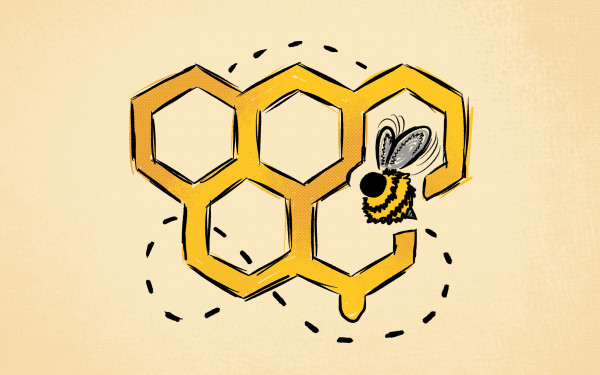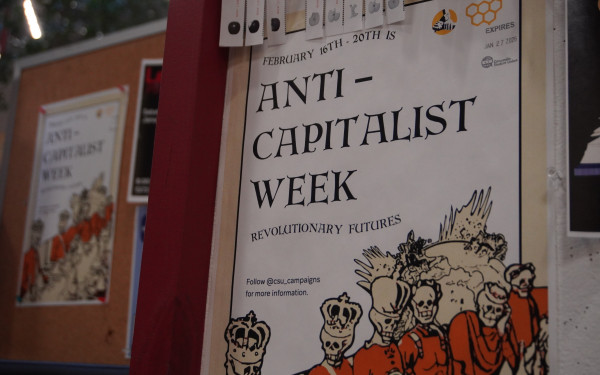Editorial : Your student union is allergic to accountability
For the second time this academic year, The Link and The Concordian have been denied the chance to run for a fee levy increase.
For the second time, our applications have been rejected on account of baseless claims marked by clear political motives.
For the second time, both student papers have been stripped of the opportunity to have the student body vote on whether it would like to support its student press.
This isn't the second time the Concordia Student Union (CSU) has abused its power; it's just a small dowel in the grand structure of its corruption.
Our opt-outable fee levies currently sit at $0.19 per credit, per student, accumulated from the undergraduate student body. Both fee levies have seen no adjustment since 2001. They reflect neither current labour nor printing costs, nor are they adjusted to inflation.
The Link and The Concordian write to you in joint solidarity to denounce the CSU and its councillors’ clear political biases, favouritism and unprofessionalism.
On Feb. 21, the CSU chairperson sent an agenda for an impromptu, urgent special council meeting (SCM) to be held on Feb. 25 to ensure the upcoming CSU elections are held properly and to rule. The agenda included the approval of fee levy applications and referenda questions.
According to the CSU’s website, the nomination period for elections was set to end Feb. 21 at 6 p.m. The agenda to remedy election-related issues was sent out at 3:56 p.m. that day.
The fee levy committee failed to convene at least once during the semester to review applications. The committee had been inactive and negligent in attending to its mandated tasks to ensure a timely and democratic nomination process.
The councillors on the committee had once again neglected their responsibilities, failed to look through fee-levy applications on time and failed to keep student groups in the loop.
Before the Feb. 25 SCM, both The Link and The Concordian had not heard any updates on their fee levy packages since the committee received them.
The Link was invited to make the case for its fee levy application to ensure that it would not be wrongfully contested, as it was in the fall. Yet the invitation itself came after several appeals from The Link’s team.
The Concordian, despite facing similar objections from the committee in the fall, did not receive any invitation to attend the meeting—nor did any of the other fee levy groups.
Although fee levy committee members at the SCM discussed inviting applicants to present their case to the committee, the discussion was shut down, with CSU members arguing this should have been raised during the nomination phase.
These proceedings are unfair.
At the SCM, 45 minutes were allocated to the fee levy committee to review, approve or deny five applications. The winter CSU general election nomination period, which is scheduled to last over two weeks, was expected to be boiled down to 45 minutes of deliberation—about nine minutes per fee levy.
When it came time for The Link to advocate for its application to be voted on by the student body—not make the case for why it deserves a fee levy, as these are independent arguments—its application was rejected. The point raised during the SCM was that The Link’s annual report was outdated. This, as The Link refuted, was incorrect.
Point 1.3.1.3 of the CSU’s Policy on Fee Levy Applications states that non-CSU groups seeking to modify an existing fee-levy must attach in their application “an audit or review engagement prepared by an external accountant for the previous fiscal year.” The Link submitted its audited 2023 annual report, as its 2024 annual report, per The Link’s by-laws, would not be ratified until its annual general meeting (AGM) in May 2025. The Link’s financial year runs from May of the previous year to May of the current year.
From what we believe is derived from political motive, a committee member rejected the application for the same reason it was denied in the fall—blaming the soon-to-be-ratified 2024 audit. The committee had ample time to raise these concerns and to iron out debatable grey areas, but instead crammed a crucial decision with grave financial ramifications into an unfair timeframe.
The Link was allowed on the ballot in Fall 2023 and Winter 2024, approved with the same documents aligned with its financial year. Why was point 1.3.1.3 not raised then? Why was The Link approved twice before, after submitting the same documents per its previous fiscal year?
Minutes before The Link was removed from the meeting following its rejection, it asked the committee to provide a solution to the bureaucratic deadlock it faces. No concrete solutions were given. Instead, The Link was told to re-read the policy and reapply with the "correct documents." The committee's logic is paradoxical considering The Link's by-laws restrict it from producing an audit at any other time than its May AGM.
The Link’s vital application was rushed, and its valid concerns were brushed aside.
The Concordian’s AGM is in December, which allowed its 2024 financial statement to be approved in time for the fee levy adjustment application. Despite this, The Concordian’s referendum question was also rejected.
Meeting minutes, which were missing crucial details from the meeting, show that the question was rejected because The Concordian’s financial statement was not audited. However, as per the CSU’s policy, groups requesting a fee levy modification can submit a review engagement prepared by an external accountant, which The Concordian did.
Had the fee levy committee bothered to open The Concordian’s financial statements, it would surely have seen the required information, in bold and all-caps, on the third page. Had The Concordian’s team been invited to discuss it with them, it would have happily pointed it out to the committee.
Despite its documents being in order and per the CSU’s policies, The Concordian’s referendum question was rejected.
The Concordian did not receive any communication from the CSU until Sunday, March 2, at 9:35 p.m. This followed multiple unanswered emails, calls and text messages to the CSU.
In that late-night call, a CSU executive confirmed that the rejection of The Concordian’s referendum question had been a committee error. This executive claimed that, because the SCM was rushed, they had not had time to fully review the application package.
On Monday, March 3, the CSU called The Link and The Concordian to discuss the union’s course of action following the dysfunctional policy interpretations. The union confirmed that it would be unable to rectify its mistakes for the general elections but claims it is exploring alternatives.
The only fee levy approved from the five that applied was a new group named ElectroCon. The club was running to create a new fee levy group, which would ask undergraduate students to pay nearly $0.40 per credit.
The club, whose mission is to throw free parties for students, faced none of the same stringent adherence to the fee levy policy as The Link and The Concordian.
According to the minutes from the fee levy meeting, the chair of the committee approved all ElectroCon’s documents, claiming they were “in order.” This, according to the CSU’s Policy on Fee Levy Applications, was not the case.
According to policy 1.2.1, non-CSU groups applying for a new fee levy must “have been functioning at least 3 years full year before the submission of its application to Fee Levy Review Committee for review [typo in original].” ElectroCon was founded just this academic year.
Policy 1.2.4.3 outlines that the group running must have “a petition in support of the fee levy’s collection, containing the name, faculty, student ID number, and signature, of at least 3,000 undergraduate students.”
ElectroCon had only collected 881 signatures.
It is clear that the committee fallaciously applied its own policy on fee levy applications for all applicants, grossly abusing its power for political and personal gain.
Our question is this: If the fee levy committee was as thorough as it claims, would this massive blunder have slipped through the cracks? Why are councillors quoting their policies selectively and unevenly?
The CSU’s oversight continues to infringe on student interests and the basic democratic right to elections.
To add insult to injury, there is no avenue to officially send a complaint about the fee levy committee’s errors. The CSU’s highest governing body, the Judicial Board, is non-functioning, with its last decision made in 2022. Despite union attempts to reinstate the board, a handful of councillors ensured this effort failed by filibustering during council meetings.
The Link and The Concordian urge the union to reinstate the Judicial Board as soon as possible. The union cannot be left to act against students’ interests without any oversight or accountability.
Student media fights for transparency, democracy and accountability. By continuing to put roadblocks in our path, the CSU reveals its intent to make decisions however it sees fit, with impunity.
Ultimately, the people most affected by the CSU’s obstruction of student press are the students—both the student journalists, who will continue to be underpaid for their labour, and the broader student body, who will be left in the dark regarding the actions of its university and student union.
This article originally appeared in Volume 45, Issue 10, published March 4, 2025.







